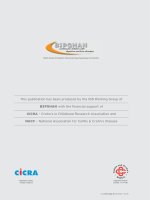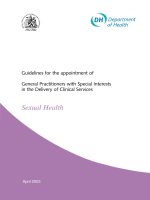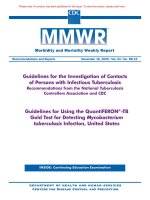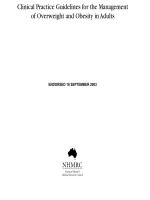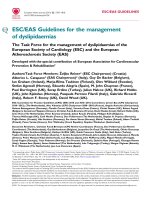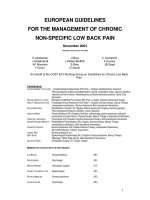Guidelines for the employment of consultants under japanese ODA loans 2012
Bạn đang xem bản rút gọn của tài liệu. Xem và tải ngay bản đầy đủ của tài liệu tại đây (368.53 KB, 56 trang )
Chapter 1: Guidelines for the Employment of Consultants
under Japanese ODA Loans
TABLE OF CONTENTS
Page
PART I
GENERAL................................................................................................................ 4
Section 1.01 Introduction ...................................................................................................... 4
Section 1.02 Need for Employment of a Consultant ........................................................... 5
Section 1.03 Responsibilities of the Borrower in Selection of a Consultant...................... 5
Section 1.04 Eligibility .......................................................................................................... 6
Section 1.05
JICA‟s Review................................................................................................... 7
Section 1.06 Corrupt or Fraudulent Practices..................................................................... 8
Section 1.07 Conflict of Interest ......................................................................................... 10
Section 1.08
PART II
Language ........................................................................................................ 13
CONSULTING SERVICES .................................................................................. 14
Section 2.01
Types of Assignment ...................................................................................... 14
Section 2.02 Responsibilities of Consultants ..................................................................... 16
Section 2.03 Impartiality of Consultants ........................................................................... 18
Section 2.04
JICA‟s files on Consultants ........................................................................... 19
Section 2.05
Monitoring by JICA ....................................................................................... 20
PART III
SELECTION PROCEDURES........................................................................... 21
Section 3.01 General ........................................................................................................... 21
Section 3.02
Method of Selection ........................................................................................ 23
Section 3.03
Preparation of the Terms of Reference ......................................................... 24
Section 3.04
Preparation of Short List of Consultants ..................................................... 25
Section 3.05
Preparation of the Request for Proposals ..................................................... 27
Section 3.06 Reference to JICA .......................................................................................... 29
Section 3.07
Sending of the Request for Proposals to Consultants ................................. 30
Section 3.08 Evaluation of Technical Proposals ................................................................ 31
Section 3.09
Public Opening of Financial Proposals ......................................................... 34
Section 3.10 Evaluation of Financial Proposals and Ranking of Proposals .................... 35
Section 3.11 Contract Negotiations .................................................................................... 36
Section 3.12 Notification to Unsuccessful Consultants and Debriefing .......................... 38
Section 3.13 Information to be Made Public ...................................................................... 39
1
Section 3.14
PART IV
Process to be Confidential ............................................................................. 39
CONTRACT ......................................................................................................... 40
Section 4.01 General ........................................................................................................... 40
Section 4.02
Scope of the Project and of the Consulting Services .................................... 41
Section 4.03 Duration of Contract ...................................................................................... 41
Section 4.04 Conditions relating to Validity of Contract .................................................. 41
Section 4.05 Responsibilities of the Parties ....................................................................... 42
Section 4.06 Contract Amount ............................................................................................ 43
Section 4.07 Description of Consultants‟ Costs and Fees ................................................. 44
Section 4.08 Currency in which Costs and Fees are to be Expressed .............................. 45
Section 4.09 Conditions and Methods of Payment ............................................................ 46
Section 4.10 Ownership and Disposal of Equipment ........................................................ 47
Section 4.11
Services to be provided by the Borrower ...................................................... 47
Section 4.12
Privileges and Immunities of the Consultant .............................................. 48
Section 4.13
Serious Hindrances ........................................................................................ 48
Section 4.14 Reports ............................................................................................................ 49
Section 4.15 Copyright ........................................................................................................ 49
Section 4.16
Modifications .................................................................................................. 50
Section 4.17
Force Majeure ................................................................................................. 50
Section 4.18
Termination .................................................................................................... 51
Section 4.19
Settlement of Disputes .................................................................................. 52
Section 4.20 Applicable Laws ............................................................................................. 53
ANNEX I
TERMS OF REFERENCE ................................................................................. 54
1. Project Information ............................................................................................................ 54
2. Other Relevant Information .............................................................................................. 54
3. General Terms of Reference .............................................................................................. 54
4. Specific Terms of Reference ............................................................................................... 55
5. Services and Facilities to be provided by the Borrower .................................................. 55
ANNEX II
SHORT LIST OF CONSULTANTS .................................................................. 56
2
Sections of the Guidelines are stated in the boxes.
Notes on the sections provided below
the boxes shall also normally be respected since they represent appropriate interpretation
of the sections of the Guidelines.
3
Part I GENERAL
Section 1.01 Introduction
(1) “Guidelines for the Employment of Consultants under Japanese ODA Loans” are
applicable to the ODA Loans provided by JAPAN INTERNATIONAL COOPERATION
AGENCY (hereinafter referred to as “JICA”), under Clause (a), Item (ii), Paragraph 1,
Article
13
of
the
ACT
of
THE
INCORPORATED
ADMINISTRATIVE
AGENCY-JAPAN INTERNATIONAL COOPERATION AGENCY.
(2) For the efficient and proper preparation and implementation of projects financed in
whole or in part by Japanese ODA Loans, most Borrowers of Japanese ODA Loans
require the assistance of consultants (In these Guidelines, the term "the Borrower"
also refers to the Executing Agency of the project and the term "consultant(s)" includes
a wide variety of private and public entities such as consulting firms, engineering
firms, construction firms, management firms, procurement agents, multinational
organizations,
universities,
research
institutions,
government
agencies,
nongovernment agencies (NGOs), and individuals).
(3) The purpose of these Guidelines is to indicate JICA's views as to the proper
selection and employment of consultants and the full utilization of consultants'
expertise, and to ensure their impartiality, and, in addition, to set forth general rules
to be followed by Borrowers in their use of consultants. Main considerations in
selecting consultants are quality, efficiency, transparency in the selection process and
non-discrimination among consultants eligible for contracts. The application of these
Guidelines to a particular project financed by Japanese ODA Loans is to be stipulated
in the Loan Agreement between JICA and the Borrower.
<Notes>
Paragraph (1):
This paragraph defines the term “Japanese ODA Loans” and states that these Guidelines
are applicable to Japanese ODA Loans.
Paragraph (2):
Since a majority of consultants employed under Japanese ODA Loans are private
consulting firms, the term “a firm(s)”, wherever used in the following Sections in these
Guidelines, may be interpreted as “an entity(ies)”,or “a consultant(s)” as appropriate.
4
Section 1.02 Need for Employment of a Consultant
In most cases, the need to employ a consultant will be established jointly by the
Borrower and JICA and the Terms of Reference for their services will be drawn up,
either prior to or in the course of the negotiations on Japanese ODA Loans. At the
same time, the two parties will agree on the approximate amount of funds required for
such services and the schedule of selection of consultants.
<Notes>
The consulting services should be provided in such a manner as to comply with the
schedule agreed between JICA and the Borrower. The Borrower may proceed with the
selection of consultants before the Loan Agreement is signed, subject to international rules
for Official Development Assistance (ODA), by consulting with JICA as to the selection
procedures to which the Borrower can advance.
Section 1.03 Responsibilities of the Borrower in Selection of a Consultant
The selection of a consultant for a project financed by Japanese ODA Loans is the
responsibility of the Borrower.
In order to ensure the efficient and proper execution of the project as specifically
required by the Loan Agreement, it is essential for the Borrower to note in the
selection process that consultants employed on projects financed by Japanese ODA
Loans clearly possess the necessary competence.
5
Section 1.04 Eligibility
(1) In order to be eligible under a contract funded with Japanese ODA Loans, a
consultant shall;
(a) be a firm or an individual of the eligible source country stipulated in the Loan
Agreement;
(b) be a firm or an individual selected based on its own capability;
(c) not be a firm or an individual stated in Section 1.06 (1); and
(d) not be a firm or an individual who has the conflict of interest stated in Section
1.07.
(2) A firm or an individual who does not meet any of the conditions stipulated in
paragraph (1) of this Section shall be ineligible to be awarded a contract funded with
Japanese ODA Loans.
6
Section 1.05 JICA‟s Review
(1) JICA may review the Borrower's selection procedures, documents and decisions.
The Borrower shall submit to JICA, for JICA‟s reference, any related documents and
information as JICA may reasonably request. The Loan Agreement will specify the
extent to which review procedures will apply in respect of consulting services to be
financed by Japanese ODA Loans.
(2) JICA does not finance expenditures for services provided by consultants who, in
the opinion of JICA, have not been selected in accordance with the agreed procedures
and JICA will cancel that portion of the Loan allocated to such services provided by
consultants who have not been properly selected. JICA may, in addition, exercise
other remedies under the Loan Agreement.
<Notes>
1.
Paragraph (1):
In general, decisions relating to employment of consultants subject to JICA’s review
and concurrence are as follows:
(01) Before proposals are invited from consultants, the Borrower shall submit to JICA
a Short List of Consultants and the Request for Proposals (refer to Notes 1. of
Section 3.05).
(02) When Quality- and Cost-Based Selection (QCBS) is adopted, the Borrower shall,
before opening financial proposals, submit to JICA the Borrower’s analysis of
technical proposals.
(03) Before initiating contract negotiations with the highest-ranked consultant, the
Borrower shall submit to JICA the results of the Borrower’s evaluation of
proposals.
(04) Promptly after executing a contract, the Borrower shall submit to JICA a duly
certified copy of the contract.
2.
Paragraph (2):
Additional remedies under the Loan Agreement may be executed by JICA at any time.
7
Section 1.06 Corrupt or Fraudulent Practices
(1) It is JICA‟s policy to require that consultants, as well as Borrowers, under
contracts funded with Japanese ODA Loans and other Japanese ODA, observe the
highest standard of ethics during the procurement and execution of such contracts. In
pursuance of this policy, JICA;
(a) will reject the result of evaluation of proposals if it determines that the consultant
evaluated as the highest-ranked has engaged in corrupt or fraudulent practices in
competing for the contract in question;
(b) will recognize a consultant as ineligible, for period determined by JICA, to be
awarded a contract funded with Japanese ODA Loans if it at any time determines that
the consultant has engaged in corrupt or fraudulent practices in competing for, or in
executing, another contract funded with Japanese ODA Loans or other Japanese ODA;
(c) will recognize a consultant as ineligible to be awarded a contract funded with
Japanese ODA Loans if the consultant or sub-consultant, who has a direct contract
with the consultant, is debarred under the cross debarment decisions by the
Multilateral Development Banks. Such period of ineligibility shall not exceed three (3)
years from (and including) the date on which the cross debarment is imposed. The
Borrower shall confirm the eligibility of consultants from this point of view.
(2) This provision shall be stated in the Request for Proposals.
<Notes>
1.
This Section conforms to the international consensus on anti-corruption (the
“Convention on Combating Bribery of Foreign Public Officials in International Business
Transactions” of the Organization for Economic Co-operation and Development
(OECD) and anti-corruption clauses of procurement and consultant guidelines under
loans of the World Bank and Asian Development Bank) and the relevant rules and
regulations of Japan.
2.
Paragraphs (1)(a) and (b):
Concrete measures to be taken against a party engaged in corrupt or fraudulent
practices under this Section are prescribed in the relevant rules of JICA.
3.
Paragraph(1)(c):
8
(01) “cross debarment decisions by the Multilateral Development Banks” is a
corporate sanction in accordance with the agreement among the African
Development Bank Group, Asian Development Bank, European Bank for
Reconstruction and Development, Inter-American Development Bank Group and
the World Bank Group signed on 9 April, 2010 (as amended from time to time).
From an operational viewpoint, JICA will recognize the World Bank Group’s
debarment of which period exceeds one year, imposed after 19 July, 2010, the
date on which the World Bank Group started operating cross debarment, as
“cross debarment decisions by the Multilateral Development Banks”.
(02) JICA will recognize a consultant as ineligible to be awarded a contract funded
with Japanese ODA Loans if the consultant is debarred by the World Bank Group
for the period starting from the date described in (a) through (c) below, up to the
signing of the contract, unless (i) such debarment period does not exceed one
year, or (ii) three (3) years have passed since such debarment decision:
(a)Issuance of the Request for Proposals, if a consultant is selected through
Quality- and Cost-Based Selection or Quality-Based Selection;
(b)Appointment, if a consultant is selected through single-source selection; or
(c)Commencement of actual selection process, if the Borrower wishes to adopt a
method of selection other than (a)(b) above.
(03) If it is revealed that the consultant was ineligible to be awarded a contract
according to (02) above, JICA will, in principle, impose sanctions against the
consultant.
(04) If it is revealed that the sub-consultant, who has a direct contract with the
consultant, was debarred by the World Bank Group on the sub-contract date,
JICA will in principle require the Borrower to have the consultant cancel the
sub-contract immediately, unless (i) such debarment period does not exceed one
year, or (ii) three (3) years have passed since such debarment decision. If the
consultant refuses, JICA will require the Borrower to declare invalidity or
cancellation of the contract and demand the refund of the relevant proceeds of
the loan or any other remedies on the grounds of contractual violation.
(05) (01), (02), (03), and (04) of this Note 3 above shall be stated in the Request for
Proposals.
(06) The Borrower shall require consultants to include in their proposals and contract
documents a letter of acknowledgement to declare that the consultant is eligible
in accordance with the applicable Guidelines for the Employment of Consultants
under Japanese ODA Loans.
9
Section 1.07 Conflict of Interest
A consultant shall not have a conflict of interest. A consultant shall not be employed
under any of the circumstances set forth below, where it is determined to have a
conflict of interest throughout the selection process and/or the execution of the
contract unless the conflict has been resolved in a manner acceptable to JICA.
(1) Conflict between consulting activities and procurement of goods or non-consulting
services: A consultant that has been engaged to provide goods or non-consulting
services for a project, or any affiliate that directly or indirectly controls, is controlled
by, or is under common control with that consultant, shall be disqualified from
providing consulting services resulting from or directly related to those goods or
non-consulting services. Conversely, a consultant hired to provide consulting services
for the preparation or implementation of a project, or any affiliate that directly or
indirectly controls, is controlled by, or is under common control with that consultant,
shall be disqualified from subsequently providing goods or non-consulting services
resulting from or directly related to the consulting services for such preparation or
implementation. This provision does not apply to the various firms (consultants,
contractors, or suppliers) only due to the reason that those firms together are
performing the Contractor‟s obligations under a turnkey or design and build
contract.
(2) Conflict among consulting assignments: Neither consultant nor any affiliate that
directly or indirectly controls, is controlled by, or is under common control with that
consultant, shall be hired for any assignment that, by its nature, may be in conflict
with another assignment of the consultant.
(3)Relationship with Borrower‟s staff: A consultant that has a close business
relationship with the Borrower‟s professional personnel who are directly or indirectly
involved in any part of: (i) the preparation of the Terms of Reference for the
assignment, (ii) the selection process for the contract, or (iii) the supervision of such
contract, shall be disqualified.
(4) Based on the “One Bid Per Bidder” principle, which is to ensure fair competition,
a consultant, and any affiliate that directly or indirectly controls, is controlled by, or
is under common control with that consultant shall not be allowed to submit more
than one proposal. A consultant (including its affiliate), if acting in the capacity of a
sub-consultant in one proposal, may participate in other proposals, only in that
capacity.
10
(5) A consultant having any other form of conflict of interest other than (1) through
(4) of this Section shall be disqualified.
<Notes>
1.
“The conflict of interest provision” herein should be incorporated into the Request for
Proposals.
2.
Paragraphs (1),(2), and (4):
In relation to “affiliate” and “control”: The ability to exercise the control is normally, but
not limited to, deemed to exist when one party has, whether directly or indirectly, not
less than 20% of all the subscribed shares or other equity interests or the total capital
of the other party.
3.
Paragraph (4):
The diagram below shows the idea of “One Bid Per Bidder” stipulated in Paragraph
(4). “X(1)” and “X(2)” in the diagram stand for the same firm or the affiliates.
(ex. 1)
A B X(1)
C D
X(2)
: Not Permitted
(ex. 2)
A B X(1)
C D
: Not Permitted
X(2)
(ex. 3)
A B
C D
X(1)
X(2)
: Permitted
Solely or
jointly & severally
Sub-consultant
liable for entire contract
11
4. Paragraph (5):
As an example, exchange of personnel in a form of secondment between a consultant
and a Contractor engaged in the same project (e.g. in a case where a consultant lends
or temporarily seconds its personnel to the Contractor and any of the personnel is
directly or indirectly involved in any capacity in the same project, that consultant shall
be disqualified from the selection for the consulting services resulting from the goods
and non-consulting services delivered by the Contractor. On the contrary, in a case
where the personnel of the consultant are not involved in the project in question, such
exchange of personnel will not constitute a reason for disqualification of the consultant.
Likewise, it is recognized that conflict of interest does not exist when the personnel
have resigned from the consultant).
5.
In principle, if it is found that a firm or consultant is in violation of this Section, that firm
or that consultant shall be disqualified from the bidding or the selection. However,
there are cases where the Borrower may suffer a disadvantage, even if there is no
fault on the part of the Borrower (e.g. due to false information provided by the
consultant and/or its affiliate, the Borrower did not recognize the relation between them
and the affiliate is awarded a contract). In such cases, JICA will take the Borrower’s
interests into consideration, while paying due attention to the overall project
implementation and the procurement policy of JICA as a whole.
12
Section 1.08 Language
All documents relating to the selection and employment of consultants, including the
contract, shall be prepared in one of the following languages, selected by the Borrower:
Japanese, English, French or Spanish. Although the Borrower may issue translated
versions of these documents in the national language of the Borrower‟s country for the
Borrower‟s reference, the Japanese, English, French or Spanish documents shall
take precedence.
<Notes>
Similarly, the proposals shall be prepared in Japanese, English, French or Spanish. In
cases where, as a result, a domestic consultant is awarded, the authenticated contract
documents may be prepared in the national language of the Borrower’s country. Even in
that case, the Borrower has to prepare a translated version in Japanese, English, French
or Spanish for JICA’s review and concurrence.
13
Part II CONSULTING SERVICES
Section 2.01 Types of Assignment
(1) In general, the services of consultants can be grouped into the following five broad
categories:
(a) Preinvestment studies, including:
(i) determination of the relative priority to be accorded a project;
(ii) preparation and comparison of alternatives, and recommendations as to the best
solution;
(iii) general engineering layout and preliminary design of major structures;
(iv) estimates of costs, benefits and construction period;
(v) evaluation of economic and technical soundness, financial and commercial
viability, suitability of organizational and managerial arrangements and social and
environmental impact;
(vi) studies and/or recommendations related to environmental and social matters,
including implementation/review of environmental impact assessments; and
(vii) other recommendations concerning implementation of the project.
(b) Preparation services, including:
(i) detailed investigations and review of preinvestment studies;
(ii) preparation of detailed designs, specifications and contract documents;
(iii) pre-qualification of contractors, suppliers or manufacturers (hereinafter
collectively referred to as “Contractor(s)”);
(iv) evaluation of bids and recommendations regarding award of contract; and
(v) studies and/or recommendations related to environmental and social matters,
including implementation/review of environmental impact assessments.
(c) Implementation services, including:
(i) supervision of construction work;
(ii) technical and administrative services for the implementation and management of
the project; and
(iii) studies and/or recommendations related to environmental and social matters,
including environmental management, monitoring and audit.
(d) Assistance in the start-up of facilities and operation:
Assistance in operation and maintenance of the facilities after the project completion
and the start-up of facilities and their operation for an initial period.
14
(e) Other services necessary for the project, including:
(i) advisory services, in connection, for example, with national and/or sectorial
development plans and institution building;
(ii) assistance in implementation of recommendations, post-evaluation and impact
studies of the project; and
(iii) other Borrower support services.
(2) Taking into account the advantages of continuity of a basic technical approach, it is
advisable that functions (b), (c) and (d) above be carried out by the same consultant. If
a consultant has already satisfactorily carried out function (a), it shall not be excluded
from the short list for a consultant to carry out functions (b), (c) and (d) because of its
prior involvement in the project.
<Notes>
1.
Paragraph (1):
(01) All these studies in (i) to (vi) of (a) are termed “feasibility studies.”
(02) “Technical and administrative services for the implementation and management
of the project” in (ii) of (c) refer to overall organizational operations, financing,
production management, market research (marketing), sales, information
management, and labor management.
(03) (d) refers to instruction and technical training associated with the operation of
the project.
2.
Paragraph (2):
Among those referred to in (ii) of (e) of paragraph (1), post-evaluation (including
evaluation of the consultant’s performance) should be carried out by a consultant
other than the consultant referred to in (b) or (c).
15
Section 2.02 Responsibilities of Consultants
(1) Consultants are at all times to exercise all reasonable skill, care and diligence in
the discharge of their duties. Consultants are responsible for the accuracy and
completeness of their work.
(2) In all professional matters a consultant is to act as a faithful adviser to the
Borrower. The Borrower may, however, in the case of supervision of work and/or
management aspects, delegate to a consultant a variable range of authority to act on
its behalf, from full responsibility to make final decisions as an independent engineer,
to that of advisor to the client with less authority to make decisions. The nature of and
the limits to such delegation of authority to the consultant, as well as the scope and
the nature of the responsibilities which the consultant is to assume shall be clearly
defined in the contract between the Borrower and the consultant.
(3) In the case of a difference of opinion between the Borrower and the consultant on
any important matters involving professional judgment that might affect the proper
evaluation or execution of the project, the Borrower shall allow the consultant to
submit promptly to the Borrower a written report and, simultaneously, to submit a
copy to JICA. The Borrower shall forward the report to JICA with its comments in
time to allow JICA to study it and communicate with the Borrower before any
irreversible steps are taken in the matter. In cases of urgency, a consultant shall have
the right to request the Borrower and/or JICA that the matter be discussed
immediately between the Borrower and JICA. This provision shall be stated in the
contract between the Borrower and the consultant.
<Notes>
1.
Paragraph (2):
(01) In this context, the consultant’s authority to act on the Borrower’s behalf is
mainly over the contractors, manufacturers and suppliers, and in some cases,
the Borrower’s staff (counterpart staff). To ensure the project proceeds smoothly,
it is important to clarify the scope of the consultant’s work for the
supervision/monitoring, for example, the authority to approve changes in the
scope of the contractor’s work. Since the scope of the consultant’s work
depends on the conditions of contract to be used for the Contractors, it is
essential that the appropriate forms of contract should be chosen before the
selection of the consultant, considering the nature of the works/services .
16
(02) In general, it is advisable to delegate to the consultant a wide range of authority,
such as “the Engineer” as defined in the forms of contract of FIDIC red/yellow
book. The Engineer is not a signer of or a party to the contract, but his name is
specified in the contract and he assumes duties and responsibilities requiring
special knowledge of technical design and management. In this case, the
Engineer is considered a person who is authorized to give instructions and
directions, to exercise options determined appropriate, and to express his views.
However, in no case should the Engineer be authorized to change the contract
between the employer and the contractor. The Engineer may only be authorized
to have the contract performed in accordance with the terms and conditions
agreed upon between the employer and the contractor.
2.
Paragraph (3):
Implicit in this paragraph is the point of view that “JICA should be informed of
important matters in a timely manner in order to enhance its monitoring of projects.”
When there is a difference of opinion between the Borrower and the consultant, JICA,
with due respect for the Borrower’s opinion, may play a catalytic role very carefully to
consolidate the opinions of the both parties. This matter shall be specified in the
contract.
.
17
Section 2.03 Impartiality of Consultants
It is essential that consultants employed in the projects financed by Japanese ODA
Loans shall be demonstrably impartial in providing any consulting services so that the
requirements regarding procurement under Japanese ODA Loans will fully be met.
<Notes>
1.
Concerning “the requirements regarding procurement under Japanese ODA Loans”:
Section 1.01 of the Guidelines for Procurement under Japanese ODA Loans
stipulates “The proceeds of Japanese ODA Loans are required to be used with due
attention to considerations of economy, efficiency, transparency in the procurement
process and non-discrimination among bidders eligible for procurement contracts.”
2.
Regarding impartiality, it is necessary to pay due attention to the stipulations of
Section 1.07 of these Guidelines.
18
Section 2.04 JICA‟s files on Consultants
(1) JICA maintains files of information supplied by a number of consultants
concerning their capability and experience.
(2) Information in JICA's files on consultants can be made available to the Borrowers
who wish to review and assess the experience and qualifications of consultants they
are considering for their projects. However, the information available in JICA's
reference files is limited, and it is frequently necessary for the Borrowers to request
additional detailed information from a particular consultant in order to judge its
capability to carry out a specific assignment.
(3) The fact that JICA has been supplied with information about a consultant does not
entitle that consultant to any contract to be financed by Japanese ODA Loans. Neither
does it indicate that JICA endorses the consultant's qualifications in general, nor that
JICA will accept the consultant's appointment for any specific project. JICA has no list
of "approved" consultants.
19
Section 2.05 Monitoring by JICA
(1) The Borrower is responsible for supervising the consultant‟s performance and
ensuring that the consultant carries out the assignment in accordance with the
contract. Without assuming the responsibilities of the Borrower or the consultant,
JICA may monitor the work as necessary in order to satisfy itself that it is being
carried out in accordance with appropriate standards and is based on acceptable data.
(2) As appropriate, JICA may take part in discussions between the Borrower and the
consultant. However, JICA shall not be liable in any way for the implementation of
the project by reason of such monitoring or participation in discussions. Neither the
Borrower nor the consultant shall be released from any responsibility for the project
by reason of JICA‟s monitoring or participation in discussions.
(3) This provision shall be clearly stated in the contract between the Borrower and the
consultant.
<Notes>
1.
This Section clearly specifies that JICA also can monitor the performance of a
consultant, who plays an important role in project implementation. JICA pays attention
to the consultant’s performance, since JICA’s participation in discussions between the
Borrower and the consultant will contribute to improved communication through the
sharing of information.
2.
Should a problem arise between the Borrower and the consultant, attempts should
first be made to solve it by the efforts of the two parties. Paragraph (2) shows that
JICA shall not be held legally liable due to participation in discussions concerning
such or similar.
3.
Paragraphs (1) and (2):
These paragraphs shall be specified in the contract between the Borrower and the
consultant.
20
Part III SELECTION PROCEDURES
Section 3.01 General
(1) JICA normally requires Borrowers to adopt the following procedures in the
selection and employment of Consultants.
(a) Preparation of a Short List of Consultants;
(b) Preparation of the Request for Proposals;
(c) Invitation to submit proposals;
(d) Evaluation of proposals; and
(e) Negotiation and conclusion of a contract.
(2) Should two or more consultants jointly submit a proposal for consulting services,
the same procedures as outlined in this Part are to be followed.
(3) If the procedures stated in paragraph (1) of this Section or the selection methods
listed in 3.02 are not applied, the selection procedures and methods shall be agreed by
the Borrower and JICA before the start of the selection process.
(4) Single-source selection (SSS) shall be used only in exceptional cases. The
justification for SSS shall be examined in the context of the overall interests of the
Borrower and the project, and JICA‟s responsibility to ensure efficiency and
transparency in the selection process and non-discrimination among eligible
consultants for contracts. SSS may be appropriate only if it presents a clear advantage
over competition:
(a) for tasks that represent a natural continuation of previous work carried out by the
consultant;
(b) in emergency cases, such as in responses to disasters;
(c) for very small assignments; or
(d) when only one consultant is qualified or has experience of exceptional worth for the
assignment.
<Notes>
1. Paragraph (2):
Evaluation of proposals should be conducted solely for the purpose of comparing the
contents of the proposals. It is inappropriate to adopt different criteria in evaluating a
proposal submitted by a single firm and one submitted by a joint venture.
21
2. Paragraph (3):
The sections of 3.01 and 3.02 basically stipulate the selection method for the consulting
firms. Selection of other types of consultants such as individual consultants,
nongovernmental organizations, etc. should be implemented with due attention to the
main considerations stated in paragraph (3) of the Section 1.01 (quality, efficiency,
transparency in the selection process and non-discrimination among eligible
consultants for contracts), and the Borrower should consult with JICA on the selection
procedures to be adopted.
3. Paragraph (4):
In reference to (a), if the downstream assignment is substantially larger in value, a
competitive process acceptable to JICA shall normally be followed, in which the
consultant carrying out the initial work is not excluded from consideration.
22
Section 3.02 Method of Selection
(1) JICA deems any of the following methods appropriate in most cases for the
selection of consultants under Japanese ODA Loans:
(2) Quality- and Cost-Based Selection (QCBS), a method that takes into account the
quality of the proposal and the cost of the services, is the commonly recommended
method.
(3) Quality-Based Selection (QBS) is a method based on evaluating only the quality of
the technical proposals and the subsequent negotiation of the financial terms and the
contract with the highest ranked consultant.
QBS should be applied only for the following types of assignments:
(a) complex or highly specialized assignments for which it is difficult to define precise
TOR and the required input from the consultants;
(b) assignments where the downstream impact is so large that the quality of the
service is of overriding importance for the outcome of the project (for example,
engineering design of major infrastructure);
(c) assignments that can be carried out in substantially different ways such that
financial proposals maybe difficult to compare; or
(d) assignments including supervision of large and complex construction works for
which it is particularly important to take safety measures.
<Notes>
JICA considers that, in the majority of cases, main considerations as referred in Section
1.01 (3) can best be addressed through competition among qualified short-listed
consultants in which the selection is based on the quality of the proposal and, where
appropriate, on the cost of the services to be provided.
23
Section 3.03 Preparation of the Terms of Reference
(1) The first step in the engagement of a consultant is for JICA and the Borrower to
agree on the need to use a consultant, on the Terms of Reference for its services, on
the type of consultant to be employed and on the approximate amount of funds
required for the consulting services.
(2) The Terms of Reference shall describe the scope of the consulting services in as
much detail as possible, especially as regards alternative solutions the consultant is
expected to explore in the course of its work and as to how much authority will be
delegated to it to act on the Borrower's behalf. In addition, the Terms of Reference
shall provide information on the background of the project, on the availability of
relevant basic data* , on national and/or other standards and the specifications to be
used in the design of the project, and on the conditions under which the work shall be
performed. (See Annex I)
(3) In the case of projects classified into specific categories in accordance with the
relevant environmental guidelines published by JICA, consulting services related to
environmental consideration, such as those described in Section 2.01, shall be included
in the scope. (See Annex I)
(4) Safety shall be emphasized in the implementation of the project. The consulting
services related to safety measures shall be specified, if necessary, in the Terms of
Reference.
* Coverage, scale and accuracy of the available maps and aerial photographs, data on climate,
hydrology and subsoil, facilities available (office space, housing, transportation, counterparts), etc.
<Notes>
1.
The need to employ a consultant and the Terms of Reference for the services will be
fully discussed during the appraisal by JICA.
Refer to Section 4.07 of these Guidelines for details concerning costs.
2.
Paragraph (2):
If necessary, training and technology transfer should be explicitly stated in the Terms
of Reference.
24
Section 3.04 Preparation of Short List of Consultants
(1) Once JICA and the Borrower have agreed on the Terms of Reference for the
consulting services required, as described in Section 3.03, the Borrower shall prepare
a Short List of Consultants to be invited to submit proposals, taking into account the
factors mentioned in Parts I and II. (See Annex II)
(2) Such a Short List shall normally consist of not less than three and not more than
five consultants. There is usually little advantage in inviting more than five
consultants to submit proposals, because with a larger number some are likely to be
less interested and the quality of proposals is likely to suffer.
(3) Should the Borrower find it difficult to compile a satisfactory Short List of qualified
consultants from the information available to it from its own past experience and
other sources, JICA will, at the request of the Borrower, make available information
on consultants, from which the Borrower may draw up its own Short List.
<Notes>
1.
In principle, the consultants shall satisfy the following conditions to be listed in the
Short List:
(01) The consultants have satisfactory overseas experience of the consulting services
concerned (e.g. detailed design, supervision) in the sector in question (in a
narrow sense, e.g. ports other than fishing ports, irrigation). However, if the
consultant is from a developing country and is to provide the consulting services
in that country, it need not have any overseas experience in the area of the
consulting services concerned.
(02) Consultants must have experience in a developing country.
(03) Experience with Japanese ODA projects is preferable.
2.
The reasons why the number of consultants normally needs to be 3 to 5 are:
-To encourage consultants to prepare well elaborated proposals by giving certain
level of opportunity to be awarded.
-To increase the probability of a well-qualified consultant being selected.
-To allow for an intense and meaningful evaluation of proposals.
-To reduce the opportunity for outside influence.
3.
Any consultant from a country other than the eligible source countries must not be
25

